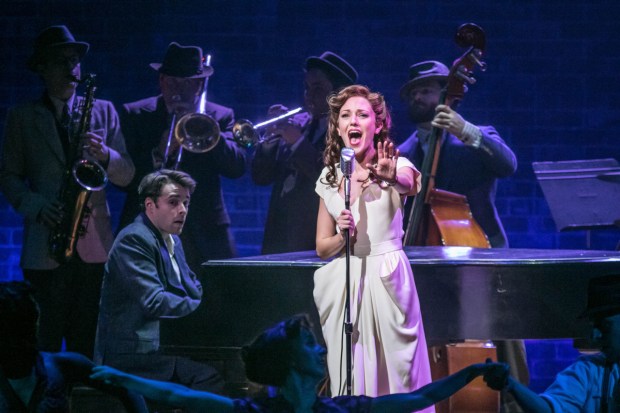The Bandstand

(© Jerry Dalia)
An opening montage takes us from the trenches of World War II to Cleveland — hometown of music wunderkind and now military veteran Donny Novitski (Corey Cott) who tries to pick up his life where he left it before the war. The only problem is that no one wants to hire a kid fresh from the war with a trunk full of original songs and demons to spare. A nationwide music competition becomes the only beacon of hope for Donny's bleak future.
MGM is looking for a swing band to pay tribute to the troops with a brand-new song that will be featured in an upcoming feature film. Donny, who considers even Frank Sinatra a hack, decides he's got it in the bag as he manically recaps his musical history in the song "Donny Novitski" — a snappy tune, with a twinge of dissonance by composer Richard Oberacker and his co-lyricist Robert Taylor, that Cott delivers with a fine balance of arrogance and mad genius. He'll cobble together a band of fellow army vets, write a hit song, and before you know it, Donny Novitski will be on the road to stardom — and perhaps escape some of the nightmares that have been haunting him since his traumatic time overseas. That is certainly the appeal for the bandmates that he recruits, all of whom have their fair share of skeletons they'd rather keep locked away.
Taylor and Oberacker, who also co-penned the book, build a lovable group of characters to make up this band of tortured misfits. Brandon J. Ellis plays a mean double bass as Davy Zlatic in between self-effacing jokes and shots of whiskey. Joey Pero wails on the trumpet as Nick Radel while forming a close friendship with straitlaced trombone player and ex-Marine Wayne Wright (Geoff Packard). James Nathan Hopkins plays the fresh-faced saxophonist Jimmy Campbell. And Joe Carroll rounds out the group as affable drummer Johnny Simpson, whose overseas head injuries have made him a little slow on the uptake but nonetheless quick on the beat.
On its surface, The Bandstand does not veer far from the tried-and-true musical-theater format: A group of underdogs come together to win the day with entertaining song-and-dance numbers sprinkled throughout (visually enhanced by Paloma Young's dance-friendly period costumes). We get a satisfying helping of romance as well when Donny checks in on his best friend's widow, Julia Trojan (Laura Osnes), who turns out to have the voice of an angel and joins the army vets (dubbed the Donny Nova Band) as a delegate for the soldiers who didn't make it home.
The tone here is fun and lively like any tourist-attracting musical should be. But Blankenbuehler adds both metaphorical and literal shadows to its shiny facade — reflected in Jeff Croiter's striking lighting and the muted colors of David Korins' set, centered around a weather-worn bandstand. He cuts through the porcelain smile of a USO show with sultry movement that melds its "Boogie Woogie Bugle Boy" exterior with a painful grit. Dancers trail each of the former soldiers like proverbial monkeys that cling to their backs. As the company transitions from these solemn moments into another one of Taylor and Oberacker's pleasant period-style numbers (Osnes' "Love Will Come and Find Me Again" by far the most memorable), the catchy tunes become more than just pleasant homages to the era of swing — they are antidotes to a collection of painful memories and emotional traumas, which, even today, are all too often glossed over in national conversation.
Cott and Osnes put their all-American faces and silvery voices to good use in this story of the muck that lies beneath a patriotic manicure. Cott's nerves are constantly on fire as the tormented, sleep-deprived musician, while Osnes asserts a refreshing amount of agency as the show's military widow (a traditionally passive archetype), who lives with her jilted mother (the hilariously wry though underutilized Beth Leavel). Osnes, who claimed the title of Broadway's princess in Cinderella, can register warmth and sweetness without lifting a finger. But as Julia, she gets to relish in some fire, challenging the browbeating Donny far more than her male bandmates, and finding herself at the center of the musical's climactic number "Welcome Home," which she delivers with showstopping fervor.
The only thing that disappoints about The Bandstand is its tendency to slip into the trite musical it distinctly is not. The all-too-neat final scene particularly betrays the level of depth and fluidity Blankenbuehler achieves in his production. But at its highest moments, The Bandstand is not just a story told with music — it's a story born from music.











